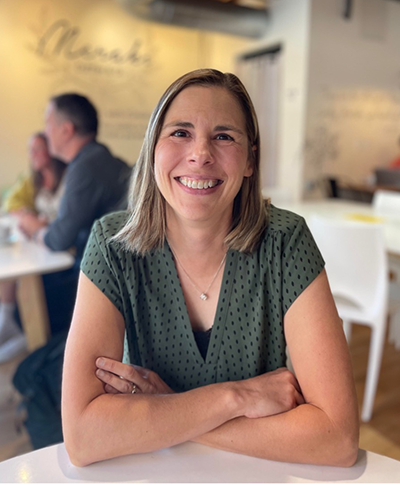Scientist Spotlight
"A Career Like None Other" : Meet ORI scientist Erika Westling, Ph.D.
In our inaugural edition of the ORI Scientist Spotlight Series, we focus on research scientist Erika Westling, Ph.D. Dr. Westling is known at ORI for her excellent communication skills, her persistence in the field, and as a good collaborator. Dr. Westling came to ORI many years ago and has had a distinctive career trajectory.

In the summer of 1995, Dr. Westling was an undergraduate at a small private liberal arts school in southern California, studying anthropology. To learn more about research in social sciences, she contacted ORI regarding possible volunteer opportunities. ORI scientist Lewis R. Goldberg, Ph.D., responded. Dr. Goldberg is a renowned personality researcher who joined ORI shortly after it was founded in 1960.
According to Dr. Westling, she owes her research career to Lew Goldberg. She volunteered with the personality research team for a summer between her junior and senior years, working three days a week at ORI and three days a week at a local pizza restaurant. She reflected, “Research was so much better than waitressing – I absolutely loved it.” After graduation, her experience with the personality team resulted in a job offer with the personality group, where she worked as a full-time Research Assistant.
Dr. Westling learned about research from the ground up as a Research Assistant, helping with proposals, creating surveys, collecting data, and working with several ORI research interest groups to develop new proposals. However, with just an undergraduate degree, she said she “reached a point where I knew I needed to go back to school to move up in the field.”
Although Dr. Westling had never taken a social psychology course, she ended up enrolling in UCLA’s Social Psychology doctoral program, due to their emerging Health Psychology program. Throughout her time in graduate school, she maintained ties with ORI scientists, and helped write a proposal with scientist Judy Andrews, Ph.D., on girls’ moods, stress, and pubertal development. This proposal was funded, and Dr. Westling came back to work on it and finish her dissertation, which also used a dataset collected by Dr. Andrews. Dr. Andrews was another pivotal ORI scientist who mentored Dr. Westling as she finished her dissertation and began working on ORI grants as an Associate Scientist. Drs. Westling and Andrews have continued their collaborations and work on several projects together today, translating their research findings on the etiology of substance use into effective prevention programs for children and adolescents.
Dr. Westling stated that perseverance is the key to success in this career choice, as securing grant funding can be quite challenging. One proposal that was recently funded was submitted five times. She said that “A significant part of this journey revolves around forging partnerships and relationships with both internal and external collaborators.” She credits ORI with facilitating her evolution from a budding scientist to successful mid-career researcher, with five current ORI grants, one grant at sister organization Influents Innovations, and one project through ORI Community and Evaluation Services.
Dr. Westling’s work focuses on the prevention of substance initiation and use for children and adolescents as well as the promotion of healthy behaviors such as physical activity and dental health. In addition, she works with collaborators at other universities on a long-term evaluation of the impact of a family-centered intervention program, the Family Check Up, offered to 731 diverse families from across the country over 20 years ago. While the target children were toddlers and children at the time their families received the Family Check Up, they are now young adults. A study funded by the National Institute of Mental Health is following up on these adults, examining long-term outcomes from the intervention, including depression, anxiety, and substance use.
Dr. Westling also supports scientists as they embark on their own careers at ORI, facilitating a monthly support group for early career scientists, working to obtain funding for postdoctoral positions, and mentoring a scientist on a funded diversity supplement.
“I love my job; ORI is the best, most supportive place, and part of why I persisted in this soft money career is because they are family-friendly and supportive,” said Dr. Westling. She reflected that her persistence may not have been possible if it were not for her supportive working environment and robust community at ORI.
Dr. Westling’s journey is a testament to perseverance, resilience, and her passion for this chosen career.
